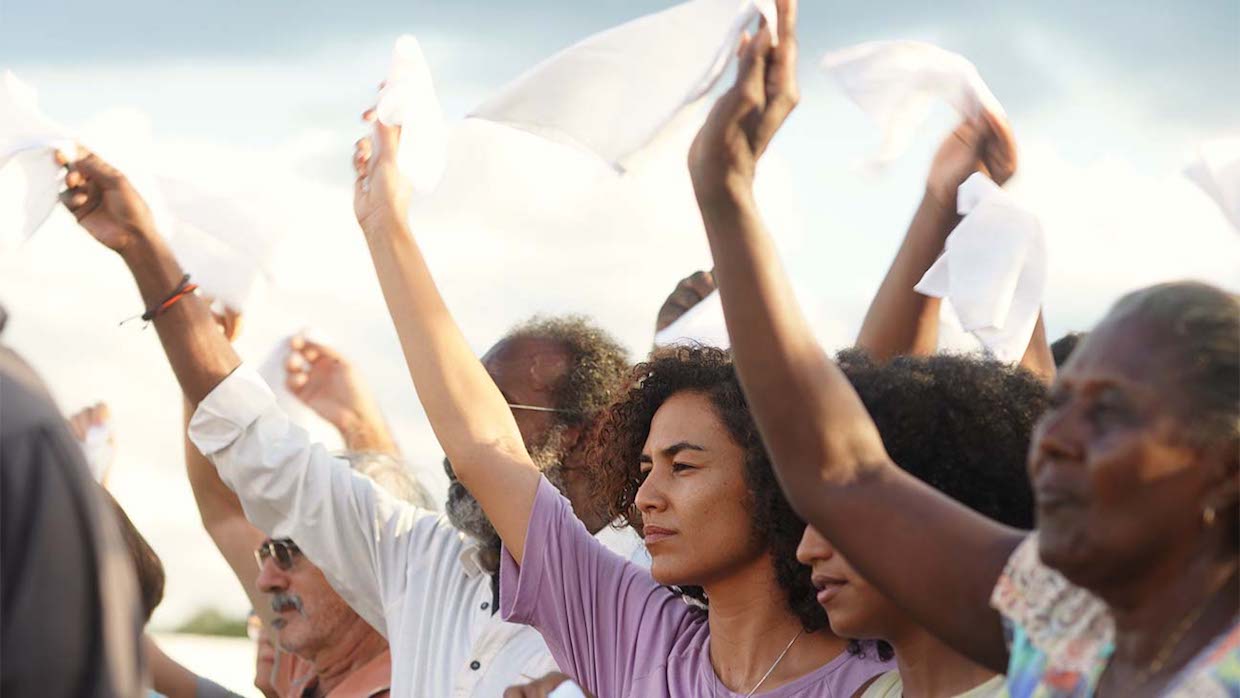 Back to selection
Back to selection
Cannes 2019 Dispatch 2: Bacurau, Zombi Child
 Bacurau
Bacurau I didn’t attend Cannes in 2009, but what I’ve come to understand to be that year’s Official Selection highlight—namely, Alain Resnais’s delirious late masterpiece Wild Grass—is precisely the kind of movie I always long to experience, here or anywhere: a vision always blossoming, driving deeper into a world entirely of its own creation, ever-willing to swerve off-road to see where the unpaved path might lead. The scarcity of such work in cinema no doubt runs down to the roots of the industry, attributable as much to the fortress of protocols one must fulfill to get any given project off the ground, which privileges clarity, templates, and fundability—a diagnosis that would need far more paragraphs to unpack than this dispatch will supply. Instead, I’ll say how grateful I am to be here, ten years later, when another film would dare to exhibit a comparable sense of abandon, risk, and madness, arriving in the barely-contained form of Bacurau.
A co-directed collaboration between Brazilians Kleber Mendonça Filho (Aquarius [2016]; Neighboring Sounds [2012]) and his production designer/producer Juliano Dornelles, Bacurau is built from myriad allegorical and symbolic references to recent and decades-past Brazilian history, much of which is coded to the extent that it may be largely indiscernible to anyone who isn’t already equipped with an archaeological knowledge of the country’s politics. To an outsider such as myself, only familiar with Brazil’s more recent upheavals and unrest, the film’s national portraiture is marked by both trenchant specificity and broad-stroked impressionism—its anger and urgency rising most clearly from the ashes of its otherworldly characters, genre signals (namely the western, but also sci-fi), and savage, often ferocious imagery. Two days later, its collapsed shape—itself a compression of several times and many places into one—continues to haunt and mystify me.
Over in the Directors’ Fortnight, Bertrand Bonello’s Zombi Child likewise flattens multiple temporal moments and attitudes into one—a strategy he’s been using to investigate France’s cultural and political history in more or less all of his films since House of Tolerance (2011). With his latest, he offers a patient and often alienating interrogation of the relationship between France and Haiti, which is centered around the real life case of one Clairvius Narcisse—a Haitian man who, in 1962 at the age of 40, is alleged to have turned into a “zombie” after taking tetrodotoxin (a common ingredient in Haitian voodoo brews), only to reappear in 1980 as a recovered man, freed from his half-alive, half-dead state. Bonello’s script connects this well-known piece of Haitian lore to modern day France by imagining Narcisse’s granddaughter, Mélissa (Wislanda Louimat), enrolls in a Legion of Honour boarding school (opened by Napoleon around the turn of the nineteenth century), where she befriends Salomé (Adilé David) and a clique of white girls, who together form an occult-curious crew straight out of The Craft (1996).
Like his troubled Parisian terrorist film, Nocturama (2016), Bonello frames Zombi Child with theoretical discourse, this time employing noted French historian Patrick Boucheron himself to play the boarding school’s history professor. Boucheron opens the film’s modern section with a semi-improvised classroom lecture in which he expounds on and critiques the development of French Liberalism and its legacy of obscuring actual liberty, while also laying out the movie’s advocation of freedom, resurgence and the distinction between storytelling and experience. Bonello’s tight mise en scène in the school is mechanically navigated via simple dolly pans to underscore the contrasts between Haiti’s tropical exoticism, the romanticism of Salomé’s love sickness for her long-distance boyfriend (Sayyid El Alami), and the steely, color-restricted aesthetics of modern France. And as the film slithers toward its literally entrancing climax—remixing characters’ bodies, voices, and locations to a genuinely unsettling degree—my sense was always that Zombi Child had been executed too academically, rarely achieving the ecstatic rushes that it momentarily achieves in its final segment. For a project that takes on such readily combustible material—not at all short on red flags and potential pitfalls (some of which I’m not convinced he avoided)—it all feels unproductively sanitary, stifling the air and its emotional axis at once.
